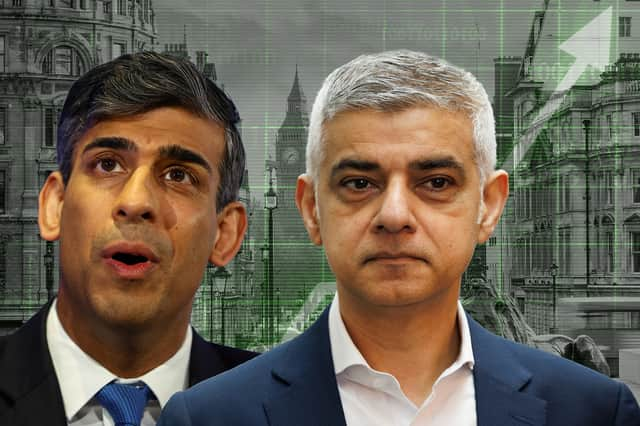PMQs fact check: are Rishi Sunak’s claims on crime going down by 50% and London taxes up by 70% true?
and live on Freeview channel 276
During PMQs, Rishi Sunak made two striking claims about crime and tax which stood out.
He said that in London, mayor Sadiq Khan “has put up taxes by 70%” and “under this government crime has been cut by 50%”. The Prime Minister then urged voters to back the Conservatives at the local elections on 2 May.
Advertisement
Hide AdAdvertisement
Hide AdBut are these statements correct? I took a look at the details to find out.
Claim: in London, his mayor [Sadiq Khan] has put up taxes by 70%
Rishi Sunak was responding to a question from Keir Starmer about the government’s ambition to abolish National Insurance contributions. Starmer asked the Prime Minister whether he would cut the state pension or the NHS, or increase income tax.
In response, Sunak started talking about Labour raising taxes saying the party “in Birmingham, putting up council by 21% and in London, his mayor has put up taxes by 70%”. It’s not clear exactly which tax Sunak was referring to, however people would assume he was referring to council tax.
However, in London council tax has not gone up by 70%. The average Band D council tax across London was £1,306 when Khan was elected in 2016, and now that sits at £1,789. That’s a 37% increase, and across the country council tax has increased in almost every local authority.
Advertisement
Hide AdAdvertisement
Hide AdNo10 sources confirmed that what Sunak was actually doing was referring to the mayoral precept, which is a small proportion of Londoners’ council tax which goes towards City Hall spending and funding the Metropolitan Police.


In 2016/17, the mayoral precept was £276, and now it sits at £471.40. This is an increase of 71%. The source said: “In stark contrast, Boris Johnson cut the mayoral precept from £309.82 to £276.00, a fall of 11 per cent under his mayoralty … no Conservative mayor has ever increased the precept.”
While Khan has put up his precept by 71%, people listening to Sunak would have assumed he was talking about overall council tax. This forms around a quarter of the average annual Band D council tax payment. The Prime Minister could have been far clearer in his comments.
Claim: under this government crime has been cut by 50%
This is a claim that has been repeated by Rishi Sunak and his ministers several times. Responding to a question from Labour MP Catherine McKinnell about crime in Teesside, the Prime Minister said: “Under this government crime has been cut by 50%.”
Now several things need clarifying about this statement. Firstly, the time period - it appears Sunak is not referring to his time in power or the current Parliament, but since 2010 when the Tories formed the coalition government with the Lib Dems.
Advertisement
Hide AdAdvertisement
Hide AdSecondly, what exactly is Sunak referring to? After speaking to Tory sources, they confirmed he is referring to the Office for National Statistics’ Crime Survey for England and Wales (CSEW). This is an estimate of the total number of crimes committed, regardless of whether they were reported to the police. As such, this is potentially seen as more accurate than police recorded crime.
And in this case, Sunak is correct if you remove fraud and computer misuse crimes from the statistics. Due to changes in reporting, these offences were not included in the CSEW until 2015. As such, Tories say they are referring to the only comparable statistics.
However, most experts say fraud and computer misuse crimes are on the rise. The ONS says: “Since April 2014, when more comparable data have been available, some rises in fraud have been observed. This is indicative of an upward trend in fraud offences, although may also reflect improvements in the reporting and recording of fraud.”
In the 12 months to March 2023, the 4.25m fraud and computer misuse offences made up almost half of the total crimes committed in England and Wales according to the CSEW. And they were some of the only crimes to rise during the pandemic. So in this sense, Sunak is being slightly misleading.
Advertisement
Hide AdAdvertisement
Hide AdThere is also a second way of recording crime, and that is the number of offences that get reported to the police. This is more susceptible to being influenced by reporting trends, for example Rape Crisis estimates that five out of six women who are raped do not go to the police. However police recorded crimes are still figures used in official statistics, and since 2010 the overall number of offences reported to the police has increased by 62%.
Sunak also said: “People with a Labour Police and Crime Commissioner are more likely to be victims of burglary and twice as likely to be a victim of robbery.” This is another example where statistics can be misleading. Labour Police and Crime Commissioners are far more likely to be elected in big cities, such as London and Manchester, where crime rates are naturally far higher, whereas Tories are more likely to represent rural areas.
Without providing context, Sunak’s statement is quite misleading. Voters would assume 50% of all crimes have gone down, however that excludes fraud and computer misuse. It’s a bit of a handful to say, but it would be much clearer if the PM had referenced this in his statement.
Ralph Blackburn is NationalWorld’s politics editor based in Westminster, where he gets special access to Parliament, MPs and government briefings. If you liked this article you can follow Ralph on X (Twitter) here and sign up to his free weekly newsletter Politics Uncovered, which brings you the latest analysis and gossip from Westminster every Sunday morning.
Comment Guidelines
National World encourages reader discussion on our stories. User feedback, insights and back-and-forth exchanges add a rich layer of context to reporting. Please review our Community Guidelines before commenting.
